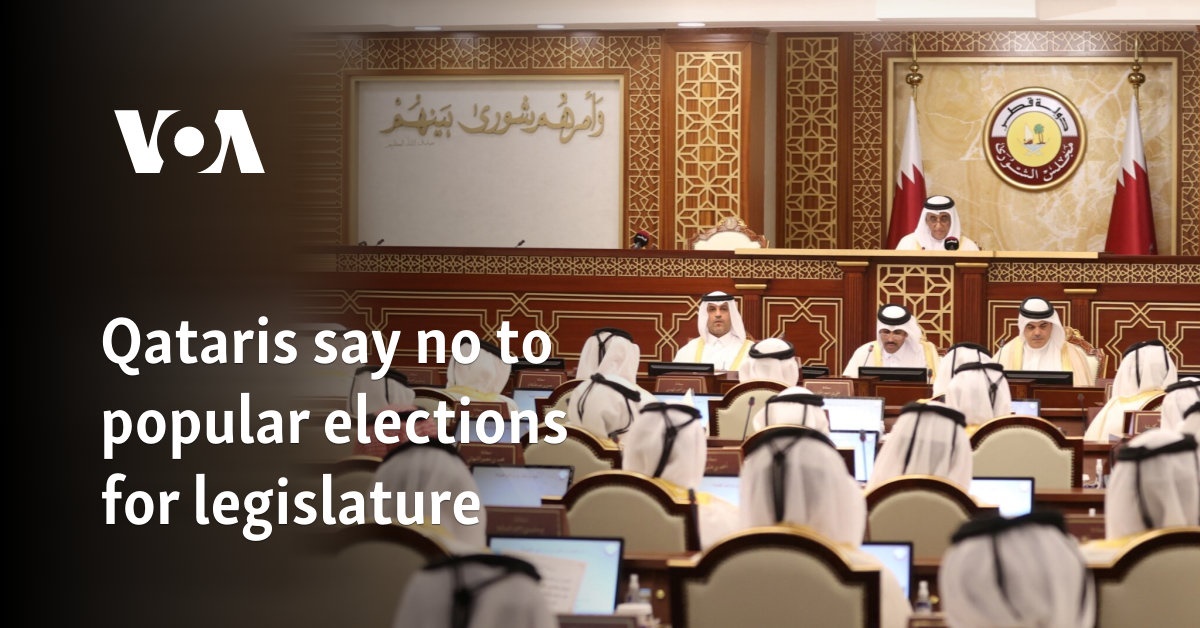Qataris say no to popular elections for legislature

Qataris have voted away the right to elect their own legislators, ending a short-lived experiment with participatory democracy in a region where authoritarian leadership is the norm.
At the same time, voters have enshrined the role of international mediator in the constitution of the Persian Gulf nation, which has hosted peace talks involving parties ranging from the Taliban to Hamas to Israel.
In a referendum held earlier this month, voters approved a package of constitutional amendments that revoked an earlier change providing for two-thirds of the seats in the nation’s legislature, the Shura Council, to be filled through popular elections. The Qatar News Agency said more than 90% of voters favored the change.
In the future, all members of the council, which approves state policies and budgets but has no say over defense, economic or investment policy, will be appointed by the state’s ruler, or emir.
The emir, Sheikh Tamim bin Hamad Al Thani, celebrated the outcome with a posting on X.
“Qataris today celebrated the fruits of what the first ones planted in terms of unity, solidarity, and love for the homeland, and the values of unity and justice, which we will protect and preserve,” he said.
But Zubair Iqbal, a nonresident scholar at the Middle East Institute and a former official at the International Monetary Fund, called the outcome “unfortunate and inherently destructive.” He said that by replacing elected representation with appointed roles, Qatar risks aligning more closely with its authoritarian Gulf Cooperation Council neighbors.
Iqbal added that the change could force emerging democratic movements underground and potentially increase repression for Qataris and expatriates.
The right of Qataris to elect representatives to the Shura Council was first approved in a 2003 constitutional amendment, but no actual elections were held until 2021, when they were recognized approvingly by the United States and the European Union.
But the process was divisive due to a provision that restricted voting to individuals whose families had lived in Qatar since at least 1930. The provision disenfranchised members of a large and influential Bedouin tribe called Al Murrah, whose members had migrated to Qatar from Saudi Arabia since then.
There were also objections that the election process caused discord within tribes and even families, disrupting national unity.
“We are all one family in Qatar,” Tamim told the Shura Council in mid-October. “The contest between candidates for membership in the Shura Council took place within families and tribes, and there are different views regarding the repercussions of such competition on our norms, traditions, as well as the conventional social institutions and their cohesion.
“The contest assumes an identity-based character that we are not equipped to handle, with potential complications over time that we would rather avoid.”
Supporters of the amendment say it has also made it possible for naturalized citizens to be appointed to ministerial roles, describing that as a step toward greater inclusivity in political representation.
Irene Postigo Sanchez, the associate program officer at the Stockholm-based International Institute for Democracy and Electoral Assistance, told VOA that Qatar’s decision to end Shura Council elections prioritizes political stability over democratic reform.
“This move aligns with a broader Gulf trend of focusing on order and minimizing divisions, which leaders fear could be worsened by more radical reforms,” she said.
“Regionally, Qatar’s choice also reflects a desire to avoid the instability seen in Kuwait’s legislature, where the emir suspended parliament earlier this year due to recurring internal gridlock.”
Sanchez was more positive about a second provision in the constitutional amendment that codified Qatar’s role as a neutral arbiter of international disputes.
Qatar has a long-standing role in international diplomacy, having served as a venue for U.S.-Taliban negotiations that led to the withdrawal of Western forces from Afghanistan and more recently for efforts to negotiate a cease-fire between Israel and Hamas.
The country has also engaged in negotiations and mediation efforts reaching well beyond the Middle East. It has played a pivotal part in securing the release of detained Americans in Iran and Venezuela, and recently helped arrange the return of some Ukrainian children from Russia.
Sanchez said the constitutional change not only reaffirms Qatar’s foreign policy but places new emphasis on its commitment to resolving regional and international conflicts through mediation and dialogue.
“By formalizing this approach, Qatar aims to strengthen its diplomatic positioning,” she said.
Related
Qatar emphasizes importance of reaching agreement between US, Iran
CAIROQatar's Prime Minister Sheikh Mohammed bin Abdulrahman Al-Thani stressed the critical need for an agreement between the US and
International Women’s Day: Seeking a Balance with Ghada Al Subaey
1309’s Ghada Al Subaey of Qatar celebrates the many layers of femininity in her recent drop, called Labyrinth of Light. This International Women’s Day, the
Discover Ooredoo Plans and Services in Qatar
Ooredoo is the household name in the field of telecommunications and provides a full portfolio of telecom services: mobile plans for everyone, home
What Will The Imminent Qatar Airways Widebody Order Include?
Which Airline Alliance Do You Prefer To Fly With?












